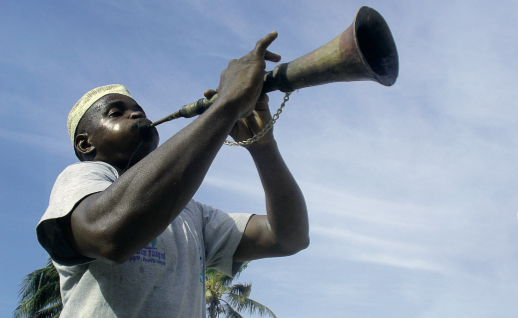
Photo: Hussein Fereji Azani (aka Siga) © Peter Kuthan
‘Parade’ is a three-day music-and-movement event which will cover Linz from 1st - 3rd May 2009 in different soundworlds. It ignores the traditional understanding of parade as a military display of disciplined marching in straight lines and in strict tempo, as well as the exotica of parades, which are often reinforcing stereotypical views. In academic terms, the concept may be regarded as ”deconstructing the image of the other” and countering the idea of musical extravaganza.
But Parade has nothing to do with academia: it is a sudden, brief and simple replacement of the uniform soundworld in which we often find ourselves – that of elevator muzak (Fahrstuhlmusik) and cellphone ringtones which frequently dominate our lives, whether we live in Austria, Zimbabwe, Nepal, Tanzania, Switzerland or Burkina Faso and which has often reduced our listening experiences to the lowest common denominator, or perhaps the so-called 08:15 norm.
We live in a world of common agreements of measurement set by the International Standards Association (ISA). Whilst this may be useful when trying to plug your computer into a ‘foreign’ socket without it blowing the power supply, it has regretfully led to a serious reduction in variety. It is sad, for example, that so many of the wonderful tunings in the world are disappearing in favor of the fast-growing ubiquity of equal temperament where fifths and fourths, in particular, are reduced from brilliant resonance to pale-grey and dull compromises.
On the other hand, when pursuing variety, we often fall into the trap of promoting plastic representations of musics on world-music stages in which a plethora and jumbled numbers of uncoordinated soundworlds compete with each other for attention and where the artists are anxious to demonstrate the strangeness (and by extension the validity) of the cultures in which they exist. Artists are whipped on and off stage without any opportunity to interact with the people they are playing before. Audience and performers are separate entities.
Parade breaks with all of this. This is purely music and movement: it is about meanderings and sometimes being in places in the urban periphery not usually associated with music like a harbor area, a factory for recycling machines or a karaoke stronghold. The musicians do not conform to any international standards of how to play together and they don’t (necessarily) think in semitones. They perform amongst people who may or may not take any interest.
The chosen artists may come from different parts of the world but their geographical position and their cultural backgrounds are not important. At the risk of conjuring up binaries, this is not a world-music festival by any stretch of the imagination. The soundworld that each group of musicians (or single musician) brings represents one or more segments of a loose type of larger ensemble [not so much an orchestra] as may be found in his/her place of origin, be it a rural village in Southern Africa or a temple square in the Himalayas.
There are wind instruments, brass, percussion and strings, in other words examples of instruments from many branches of the human musical-instrument family. This might better be described as blowy, plucky, bangy and horny.
The work is not deliberately choreographed or deliberately composed in the sense of ballet/dance or Ives’ ‘Three Places in New England’. It is free sound which is sometimes isolated and sometimes comes together. But neither is it chaotic and has borders in which it operates: the musicians come with their own ideas of movement in space. They have also been deliberately chosen, as are the ‘venues’ in which they will play. But they are free to move within the parameters of (pre)designated space such as the Pöstlingberg, the Harbor area and the Solar City.
Parade will take place from 1st - 3rd May 2009 – hopefully in splendid spring weather and somehow in contrast to this day’s traditional processions.
Parade is both, a very special listening experience - “Hörerfahrung” - and entertainment in the best sense of the word.
Keith Goddard
November 2007


Dear Keith,
I like your description of Parade. Some time I’d like to hear too how things are going with you. Not bad with us, just the usual effects of time and tide.
Andrew